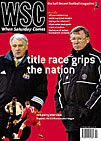 Arsène Wenger and David O'Leary have a moan
Arsène Wenger and David O'Leary have a moan
As we know, David O’Leary and Arsène Wenger are as fiercely competitive as their players. Just now they are locked in competition to prove that their club is the most unpopular, and therefore the most put upon, in the Premier League. David O’Leary seems to have been stopping every passing reporter in recent weeks to tell them of his despair at Leeds’s declining reputation. “From the being the second favourite club of most neutral supporters,” he says, “we seem to have become the most hated club in the country,” a development he ascribes partly to the Bowyer-Woodgate trial and its aftermath, since which “nobody misses the chance to criticise and condemn us”.
Arsène Wenger has found a wide variety of subjects to gripe about since his arrival at Arsenal in 1996, but most of his recent tirades have focused on two themes. The first is his belief that Patrick Vieira is being all but chased out of English football by malicious officials and administrators. Speaking after it emerged that Vieira might be called before a disciplinary panel for an incident in the FA Cup fifth round tie with Gillingham, Wenger said: “I think there’s a campaign to get Patrick charged every time. If he was an England international going to the World Cup I don’t think it would be the same.”
Aside from the attacks on the good reputation of Vieira, the Arsenal manager also suspects the football authorities of harbouring a more general determination to do down the Gunners at every opportunity. One such case was the decision that the FA Cup quarter-final with Newcastle should kick off at 5.30 for live TV coverage: “Thanks to the FA again for their help. If we had said Saturday at 5.30pm, the FA would have said 8.30pm.”
O’Leary and Wenger both choose to present themselves as being at the mercy of a hostile media – “I’m told there have been training ground bust-ups. News to me,” says the Leeds manager sniffing a plot – yet both assiduously court sections of the press, using selected journalists to transmit their views to the world.
Many other managers have cultivated an “us v them” mentality as a means of strengthening team spirit, with varying degrees of success. But Wenger and O’Leary also happen to preside over teams with woeful disciplinary records that can’t be satisfactorily explained away by reference to refereeing conspiracies, as Arsenal’s vice chairman David Dein attempted to do at a recent meeting of Premiership chairmen. (According to the Mail on Sunday, Dein’s “rant on refs” in the wake of Arsenal’s 12 dismissals this season was greeted by many of his fellow chairmen “struggling to keep a straight face”.)
If Wenger and O’Leary’s teams have indeed made themselves unpopular with the neutral observer then this is where it has happened. While both managers remain keen to identify malign plots against them, the rate at which their players harvest red and yellow cards seems unlikely to slow down.
It’s not O’Leary’s or Wenger’s job to make themselves popular with fans of other clubs. But where is the evidence that fostering a culture of permanent mild paranoia produces results on the pitch? Although Leeds’ achievements in the Champions League last season were highly creditable, they have yet to win a trophy under O’Leary. Arsenal have not done so since Wenger’s Double triumph in 1998. In his recent book, Leeds United On Trial, O’Leary explicitly states that he wants to move the club away from the legacy of Don Revie (“I had a vision of a new Leeds team that would delight real football fans all over the country”). But at the moment there is no side both Leeds and Arsenal resemble more than Revie’s Seventies incarnation: petulant, sporadically violent, ungracious, – and more often than not second best.
Many of the same words could also be used to describe Alex Ferguson’s Manchester United, yet there is a subtle difference between his brand of moaning and that of Wenger and O’Leary. While Ferguson is more than willing to make outrageous judgments on particular incidents, the driving force of his side is massive self-belief, not a grudge against the world. And that is expressed best in their disciplinary record, which, in contrast to Wenger’s Arsenal in particular, has generally been good.
For all their faults, it is easy to warm to relatively artless enthusiasts like Bobby Robson or Kevin Keegan simply because they’re happy to be what they are in the football world. Neither Wenger nor O’Leary, by contrast, gives the impression they enjoy their job very much. If they’re constantly aggrieved while running two of the biggest clubs in the country, some might say, they should toddle off to Halifax or Leyton Orient and see how much they like that.
From WSC 182 April 2002. What was happening this month